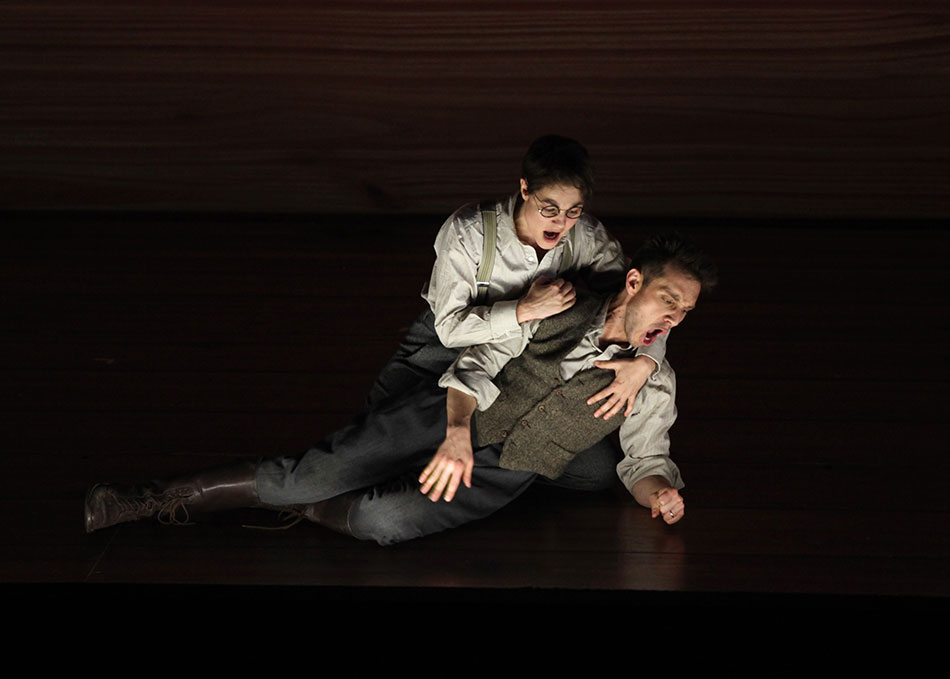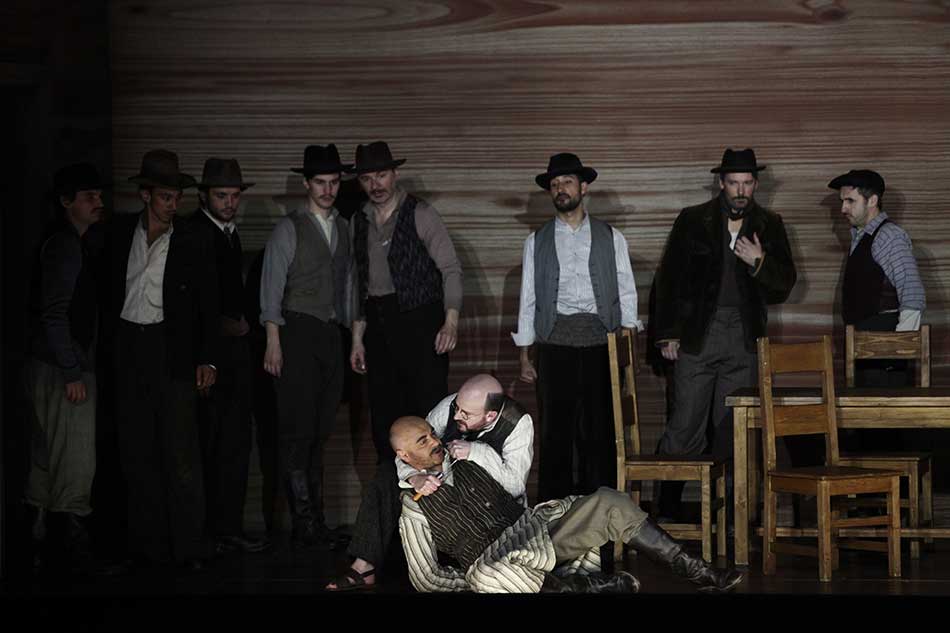The first audience that first saw Marc-Antoine Charpentier’s opera David et Jonathas performed, in 1688 at the Jesuit college Louis-le-Grand in Paris, saw not a free-standing work but a series of musical interludes making part of a much longer program. The opera’s prelude and five acts were interlarded with the five acts of a Latin verse play, Saül, covering the same events from a different perspective, with the play carrying the chief narrative burden. One can only imagine how the auditors must have looked forward, through those lines of Latin recited by the student body of the college, to the musical efflorescence that was to follow. Charpentier’s scenes—setting a libretto by François Bretonneau about the Old Testament friendship between Jonathas, son of King Saul, with Saul’s enemy, the future King David—must have seemed an oasis of relaxation and emotional outpouring to be anticipated, much as the opera’s protagonists await their all too brief reunion.
With the heavy lifting of narration shifted elsewhere, the opera is free to devote itself to almost nothing but high points. Characters and situations are isolated and offered up for consideration, giving us more a series of disjunctive pictures than a linear enactment of the whole story. Everything is of maximum intensity. Within a few moments of the beginning of the Aix-en-Provence Festival production of David et Jonathas now playing at the Brooklyn Academy of Music, conducted by William Christie, performed by his company Les Arts Florissants, and directed by Andreas Homoki, the music had taken over with overpowering thoroughness.
The jubilant choral scene with which the first act opens, celebrating David’s victory in war, is followed immediately by the solitary air in which David (Pascal Charbonneau) establishes himself as the most mournful of heroes, evoking with horror the flow of blood in battle, questioning himself, suffering from guilt at the likelihood that he will be forced to betray his bonds of loyalty to Saul (Neal Davies). David thus sounds immediately the deepest level of feeling—“I perish myself, or I lose what I love”—he will be defeated in battle or forced to kill his king, Saul, and his beloved friend, the king’s son Jonathas (Ana Quintans)—laying out the shape of the drama at the outset.
This harsh soliloquy is followed by another choral scene that balances uneasily between martial triumph and pastoral rejoicing, with flutes underscoring David’s plea for peace, and the freed captives singing: “Without the rigors of slavery / no heart has ever fully tasted / the charms of liberty.” The act’s opening chorus having forcefully and repeatedly emphasized amour, the libretto will continue to interweave charged nouns evoking the most fundamental categories—triomphe, paix, liberté, gloire, vengeance—whose meanings will be perpetually shuffled and questioned by the music. At any moment there is a choice between one or the other, war or peace, love or duty, pleasure or sorrow; but the next harmonic shift may put all in doubt again.
It is tempting to dwell on the response of those who heard David et Jonathas when it was a new thing, to imagine as far as possible what nuances of meaning and feeling they might have absorbed from this music and the words it does not so much set as deeply contemplate—but contemplate in briskly maintained rhythm, moving at a pace reinforced from time to time by choral encouragement—“hâtez-vous, hâtez-vous,” “courez, courez”—to make haste and run. The wonder is that a work designed for such very different circumstances and for such a very different audience can be experienced in the present moment—in Christie’s production at BAM—as an incredibly compressed, exhilarating, and finally wrenching experience. Indeed, it is hard to imagine that what those original auditors heard could have surpassed what Christie has elicited from his players and singers.
In the small resonant confines of Brooklyn’s Howard Gilman Opera House the sound seemed bigger than the room; it was like an invasion of clarity. Last year about this time in the same space Christie brought back his legendary production of Lully’s Atys. This time around it is the turn of the composer whom Lully, exercising his royally licensed operatic monopoly, almost successfully prevented from practicing the craft of opera except in miniaturized form. (David et Jonathas, like the resplendent Médée, was produced after Lully’s death.) It is hard not to feel awe for the sort of resurrection that Christie has effected, over so many years, in revealing a neglected repertory and nurturing a school of performers able to perform it at such a level.
Advertisement
Atys was staged to suggest the decorum of a seventeenth-century production. Andreas Homoki’s direction of David et Jonathas is something else again. He has set it somewhere in the Mediterranean world, sometime in the early twentieth century—at moments I had the impression that the Biblical wars of Israelites and Philistines were in some fashion being displaced onto the conflicts of Jews and Palestinians. The narrative of the opera, however, does not lend itself to easy historical analogies, especially since the intricacies of the back story (familiar though they would have been to Charpentier’s audience) are not actually explicated on stage. The precise nature of the allegiances and alliances at stake is left suggestively vague. We see settlers’ caps and fezzes, European suits and Arabic robes.
A further layer of story is glimpsed in a number of mimed flashbacks in which we are shown scenes from the childhood of both protagonists, Jonathas wearing eyeglasses and knee pants, David in fez as if he were a native adopted into a colonial family. In one such flashback we witness the death of Jonathas’s mother in the midst of the children’s play, and are given to understand, by way of his father Saul’s baleful gaze, that Saul may blame David for precipitating that death. The production is a very busy one, with a good deal of physical action, lunging, despairing prostrations, overturned furniture. The parley between Saul and Achis (Frédéric Caton) becomes a tussle between captor and captive, with Saul pulling a knife at one point.
At its best Homoki’s staging vibrates in intimate connection with the emotions already expressed in Charpentier’s score. The opera’s chief characters—David, Jonathas, Saul, the traitorous Philistine Joabel (Kresimir Spicer)—are not types but starkly characterized individuals, and they emerge here in all the messiness of their conflicted impulses. The label “Biblical tragedy” is earned by the sympathy one can feel for all; even Joabel is seen as suffering himself from the poison of his own envy. As for Saul, sung with raging persuasiveness by Davies, he becomes the dominant, almost Shakespearean figure of the maddened despot, shifting from suspicion to distorted affection to taunting rage, the very image of instability: “Everything betrays me, everything redoubles my sorrow… A hidden enemy strikes more surely.”
The mood is of local warfare, unstable clan alliances exacerbated by bitter splits within families: an oppressiveness alleviated by the joyous love of David and Jonathas, a mixture of boyish horseplay and frankly acknowledged devotion. It is inevitable that a modern production of the opera will cast it as a homoerotic love story, even if clearly the Jesuits of Louis-le-Grand had no trouble reconciling it with their own orthodoxies. Homoki compounds the mix by presenting the bitterness of the traitorous Joabel as that of a spurned suitor, rejected by David after a clumsy pass.
Bretonneau’s libretto is certainly remarkable for the degree to which it minimalizes explicitly religious concerns; aside from the quite free hand it takes with its Biblical sources, it reverts constantly to earthly sentiments, earthly desires, earthly suffering. As for Charpentier’s intentions, one can only say that the duets between David and Jonathas—beautifully sung here by the high tenor Charbonneau and the soprano Quintans—sustain a tone of unrelentingly anguished passion confronting imminent loss, right up to Jonathas’s final utterance—“Du moins je peux vous dire encore que je vous aime” (“At least I can tell you again that I love you”)—a musical phrase cut off before it can be resolved.
When, in the middle of their joyful reunion in the second act, a bass voice from the chorus announces that “everything ends in life,” it signals the transition from winter to spring and from war to peace, clearing a space for the ecstatic love of David and Jonathas, but announces as well that the interlude of untrammeled fulfillment will also come to an end. Whatever pertains to the friends’ relation is a world apart, of peace and pastoral delight. It is a world that will be lost in the very moment of David’s triumph, a triumph in which for that reason he can take no gratification. In Homoki’s visualization the last celebratory chorus was an image not of triumph but of indifference to the real tragedy of what has just happened. With Saul and Jonathas dead “the mighty are fallen” but David, the victor, is relegated to the margins. By becoming king he ceases to be himself.
As to the set, it is a series of variations on a wood-lined interior, some kind of pioneer dwelling with the most rudimentary furnishing. This size and shape of this space changes radically in the course of the action, widening to anamorphic proportions, going in and out like an accordion, closing in to form claustrophobic cubicles. At times characters are squeezed by the shrinking frames like characters in the comic strip Little Nemo in Slumberland. To the visual patterns created by the constantly metamorphosing set are added the abruptness with which the curtain falls at the end of each scene, completing its descent before the last note has fully sounded. These devices reach a peak of elaboration in the scene of Saul’s visit to the witch of Endor, originally the opera’s prelude but here transposed to follow the third act. The witch (sung by the high tenor Dominique Visse) is accompanied by multiple replicas of herself, all wearing the house dress worn in the earlier flashbacks by Saul’s wife, and the room itself becomes multiple rooms. We might imagine we had stepped out of the Biblical narrative altogether into a room at The Shining’s Overlook Hotel.
Advertisement
Homoki’s direction, abetted by Paul Zoller’s scenic design, is constantly impressive and often brilliantly inventive, but I did sometimes feel as if I were being pulled away from the music. At other moments it was more like experiencing a live-action palimpsest, as if watching a twenty-first-century movie constructed to accompany a very old soundtrack that was itself the setting of a text derived from sources almost unknowably ancient. Holding firm in the middle is Charpentier’s music, which when conducted and interpreted with this degree of acuity, seems to serve as its own staging, its own acting.
David et Jonathas is playing at the Brooklyn Academy of Music through April 21.



